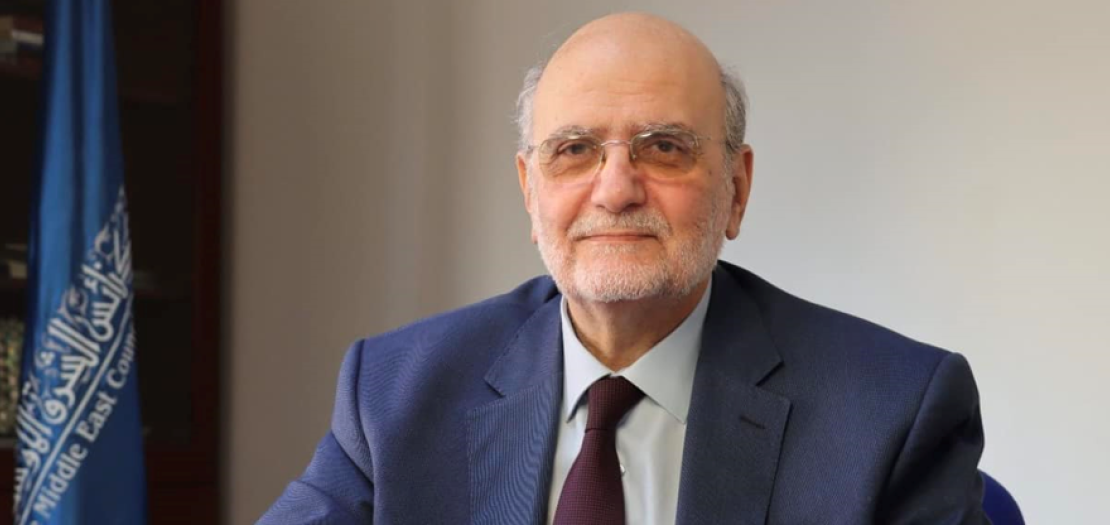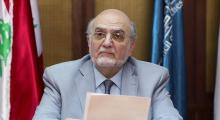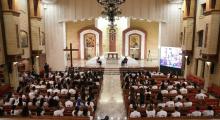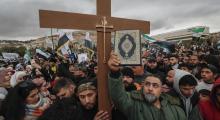Issued by the Catholic Center for Studies and Media - Jordan. Editor-in-chief Fr. Rif'at Bader - موقع أبونا abouna.org

In front of the royal temple door, the Patriarch of Antioch, John X, most blessed, loving, and venerable, stood addressing fate, delivering words improvised for the occasion.
His Beatitude could not read what he had written, because the written word, for all its greatness, can imprison the spirit and restrain emotion, and the situation called for feeling as much as it did for reason.
The moment was solemn. Martyrs lay before the icon of the Lord and His Mother, beloved patriarchs attended in love and solidarity, believers came from all over the country, and grieving families, what a tragedy. It was a scene that summarized part of our troubled history, which has not known stability for centuries.
The Patriarch of love and wisdom addressed the martyrs who ascended on the Feast of the Antiochian Saints, entrusting them to the Lord where they have gone, asking them to pray for us, as they have preceded us to the dwellings of eternity, where the Lord’s true kingdom lies, never of this world.
His Beatitude addressed “our Christian children in all of Syria and everywhere in the world,” and also “every Syrian, whether Muslim or Christian,” because he saw that “what happened is not an isolated incident or an individual act or attack” targeting a person, family, or group, but “an assault on every Syrian and all of Syria.”
The Patriarch’s stance is deeply national, viewing the country’s people as equal in rights and duties, and, most importantly, equal in destiny, for the massacre - yes, a massacre- that targeted a key component of the country, targeted all of its people. Thus, he regarded the cradle of Christianity, Syria in its entirety, as concerned.
In his words, His Beatitude recalled history to affirm that the country can maintain civil peace and social cohesion, noting that what happened is the first of its kind since the events of 1860, over a century and a half ago.
Consistent with His concern for civil peace, His Beatitude affirmed that Christians are above all these events and will not allow this “heinous crime to ignite national or sectarian strife,” stressing the preservation of national unity in solidarity with all components of the nation, regardless of affiliation.
.
As for the depth of belonging, His Beatitude stressed that Christians are “an essential and founding part of this country” and remain steadfast where they were born and have always lived, reminding that the kidnapping of the Aleppo bishops Paul and John, and the nuns of Maaloula, did not drive them away. He declared: “Here we always are. The heinous crime happened the day before yesterday. And we will remain.”
Turning directly to the state, responsible for the people, their reality, and their fate, His Beatitude reminded that people are in miserable living conditions, and that the state must fulfill its promises, democracy, freedom, equality, law, security, and peace. He rejected the notion of Christians being pitied; they are martyrs of faith and nation, not casualties, and no one should mourn them, but rather the government, for failing to protect its people both nationally and in daily life.
At the same time, His Beatitude returned to the national dimension, the most lasting, affirming that Christians in Syria are “authentic citizens” whose land is their dignity. They are keen on national unity and expect others to reach out in building the Syria that every citizen dreams of. He insisted that Christians are not afraid, for the Lord has overcome the world. They will carry on, ready to defend their Muslim compatriots if such a tragedy were to occur in a mosque.
His Beatitude addressed all concerned with what happened on that bloody Sunday in the church, entrusting everyone with the responsibility that is theirs, combining in His words faith, national unity, and building the state, which in the end is the guarantor of all social dynamics that lead to progress and prosperity.
This emerging state in Syria, which has promised its people much, must heed what is said to it in good faith, such as the words of His Beatitude and all those with goodwill and concern for the people’s future who desire a better life for them. In this context, I allow myself to urge those responsible for public affairs in Syria to beware of lost time during transition periods, which are always difficult, as is the case today, because rebuilding the state is complex and requires knowledge, experience, and expertise. May opportunists do not disrupt the country’s stability in this critical period.
At the same time, the state, with all its capabilities, must protect civil peace and social solidarity, the foundations of stability, without which there can be no growth or progress. The Antiochian Levant has lived through centuries of invasions, occupations, wars, and unrest, transforming it from a cradle of civilization to a hotbed of turmoil. It is time for it to enjoy some stability so that its creative people can once again contribute to building global civilization.







